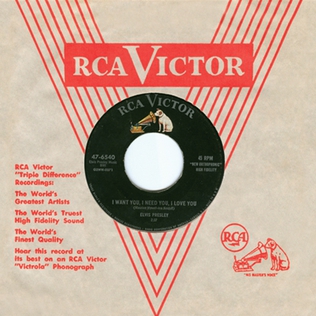
I Want You, I Need You, I Love You
"I Want You, I Need You, I Love You" is a song written by Maurice Mysels and Ira Kosloff. It is best known for being Elvis Presley's seventh single release on the RCA Victor label, produced by Steve Sholes.[1] It was released in May 1956, becoming Presley's second number 1 single on the country music charts, and peaking at number 3 on the US Billboard Top 100 chart, an earlier version of the U.S. Billboard Hot 100.[1] Before the establishment of the Billboard Hot 100 chart in 1958, there were a number of charts including Jukebox plays, Store charts, and Airplay charts; the song reached number 1 on the Billboard Top Sellers in Stores chart.[2]
"I Want You, I Need You, I Love You"
May 4, 1956
April 14, 1956
2:37
Maurice Mysels, Ira Kosloff
Reception[edit]
"I Want You, I Need You, I Love You" was backed with "My Baby Left Me" and was released on May 4, 1956.[5] Pre-orders of over 300,000 were the biggest ever in the history of the company. At the time of its release, Presley had three songs in the Top 20: "Heartbreak Hotel/I Was the One," "My Baby Left Me", and "I Want You, I Need You, I Love You". On June 5, 1956, Presley performed the song on The Milton Berle Show, as well as an early version of "Hound Dog"[5] that resulted in both overwhelmingly favorable audience reaction and outrage.[5] Despite the heated public controversy, the single was generally well-received, reaching No. 3 on the Billboard Top 100 chart, and scoring No. 1 on the country music chart.[1] The song earned a second gold record for Presley, with sales in excess of 1.3 million.[1]
Cover versions[edit]
Robby Krieger performed an instrumental version of the song on his 1989 solo album, No Habla.[6]
In popular culture[edit]
John Lennon mentioned the song in the final interview he recorded on December 8, 1980, noting, "If I hear Elvis, I heard him singing "I Want You, I Need You, I Love You" the other day, I mean I was just in heaven. I mean, of course I was going back to my youth and remembering the dates, and what was going on when I heard that music.” [7]